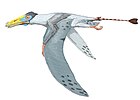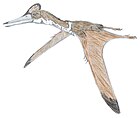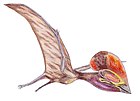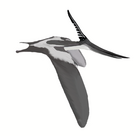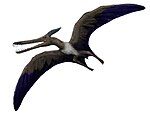Fenghuangopterus
| Fenghuangopterus Temporal range: Middle Jurassic,
| |
|---|---|
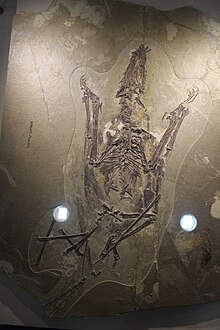
| |
| Fossil specimen, Beijing Museum of Natural History | |
| Scientific classification | |
| Domain: | Eukaryota |
| Kingdom: | Animalia |
| Phylum: | Chordata |
| Order: | †Pterosauria |
| Family: | †Rhamphorhynchidae |
| Genus: | †Fenghuangopterus Lü, Fucha & Chen, 2010 |
| Species: | †F. lii
|
| Binomial name | |
| †Fenghuangopterus lii Lü, Fucha & Chen, 2010
| |
Fenghuangopterus is a genus of basal pterosaur that lived in northeastern China during the Middle Jurassic.
The type species Fenghuangopterus lii was in 2010 described and named by Lü Junchang et al. The generic name is derived from the Fenghuang Mountain and a Latinized Ancient Greek pteron, "wing". The specific name honors Li Xiumei, who donated the fossil. It is known from a single relatively complete, though badly crushed, fossil skeleton, holotype CYGB-0037, recovered from the Tiaojishan Formation of Liaoning Province, about 160 million years old. Fenghuangopterus is a member of the rhamphorhynchid subfamily Scaphognathinae, which had previously been known only from the Late Jurassic and includes the close relatives Scaphognathus, Sordes and Harpactognathus.[1]
Description
[edit]Fenghuangopterus was similar to other scaphognathines in its short, blunt skull with a large antorbital fenestra, and widely spaced, vertically oriented teeth (as opposed to the horizontally-oriented teeth of other rhamphorhynchids). Like all known rhamphorhynchids its tail was stiffened by long vertebral extensions. The primary differences between Fenghuangopterus and other scaphognathines reside in its more numerous teeth — eleven in the upper jaw — which extended further back in the jaw than with its relatives, and its earlier time period.[1]



